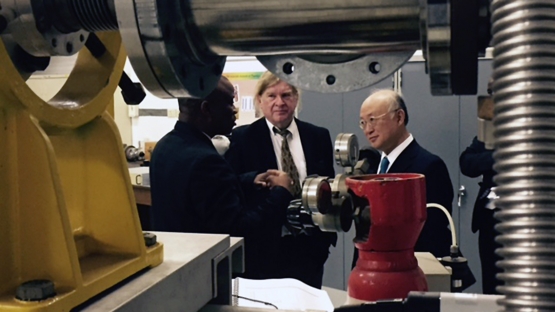Nuclear technology has much to contribute to the social and economic development of Africa, IAEA Director General Yukiya Amano said in Pelindaba, South Africa at a special event marking the 50th anniversary of the country's first research reactor.
"Your country provides an excellent example of how modern technology can be used effectively to advance development and improve people's lives," he said. "South Africa is also a role model in terms of South-South cooperation, generously sharing its expertise in the nuclear field with countries on the African continent and beyond."
In his address to a select audience that included President Jacob Zuma, Mr Amano noted that the SAFARI-1 research reactor is the leading producer of medical isotopes on the African continent. It is also one of the four largest producers in the world of one key isotope - molybdenum-99 - which is used in over 70 per cent of nuclear medicine procedures globally.
Mr Amano highlighted the cooperation between the World Health Organization, the IAEA and national governments on increasing access to oncology and radiotherapy services in developing countries. "I am very grateful for the active role which South Africa plays in sharing its cancer expertise with other countries, especially in providing specialist training and fellowships."
Referring to the top global health concern of 2014, the Ebola outbreak in West Africa, Mr Amano outlined the IAEA's rapid response measures, which included providing equipment, laboratory supplies and technical advice. This contributed to quick diagnosis of the disease in affected countries. Follow-up work will help African countries to better track and detect animal diseases that can eventually be transmitted to humans, such as Ebola, he said, adding that South Africa's National Institute of Communicable Diseases has been an indispensable partner in this work.
Treating animal diseases, fighting pests and increasing agricultural productivity have also been important pillars of the IAEA's work in Africa, Mr Amano said. The Agency has worked with local partners across the continent to contain, and in some cases eliminate, animal diseases such as foot-and-mouth disease and rinderpest, which can destroy the livelihood of communities. Click here to read about the results of the IAEA's recent work in the eradication of tsetse flies in an important agricultural region of Senegal.
Keeping the lights on: the role of nuclear
Emphasizing that access to electricity is critical to development, Mr Amano spoke of the role nuclear power can play in developing countries. "Many countries see nuclear power as a stable and clean source of energy that can help to mitigate the impact of climate change," he said. South Africa plans to expand its nuclear power programme in the coming years, while also investing in other areas such as renewables.
Since the Fukushima Daiichi nuclear accident in 2011, the nuclear industry has introduced important additional safety measures, Mr Amano noted. "I have seen a strengthening in safety features in every nuclear power plant that I have visited in the past few years," he said. "The idea that "Safety Comes First" is unchallenged. Nuclear power is now safer, throughout the world, than it was before Fukushima Daiichi."
Mr Amano also spoke of the importance of clear and safe nuclear power in his opening address at the Nuclear Africa 2015 conference earlier during the day.
"Nuclear power can deliver the steady supply of baseload electricity needed to power a modern economy," he added. Nearly 70 power reactors are under construction around the world, many of them in developing countries.
"Supporting Africa is a high priority for the IAEA," Mr Amano said. "We are working closely with countries interested in nuclear power to help them build the necessary expertise."
Earlier, Mr Amano held discussions with Minister of Energy Tina Joemat-Pettersson and visited the Ithemba Laboratory for Accelerator-Based Sciences at Wits University. His schedule also included meetings with President Zuma and Minister of International Relations and Cooperation Maite Nkoana-Mashabane.
Nuclear power is now safer, throughout the world, than it was before Fukushima Daiichi.




